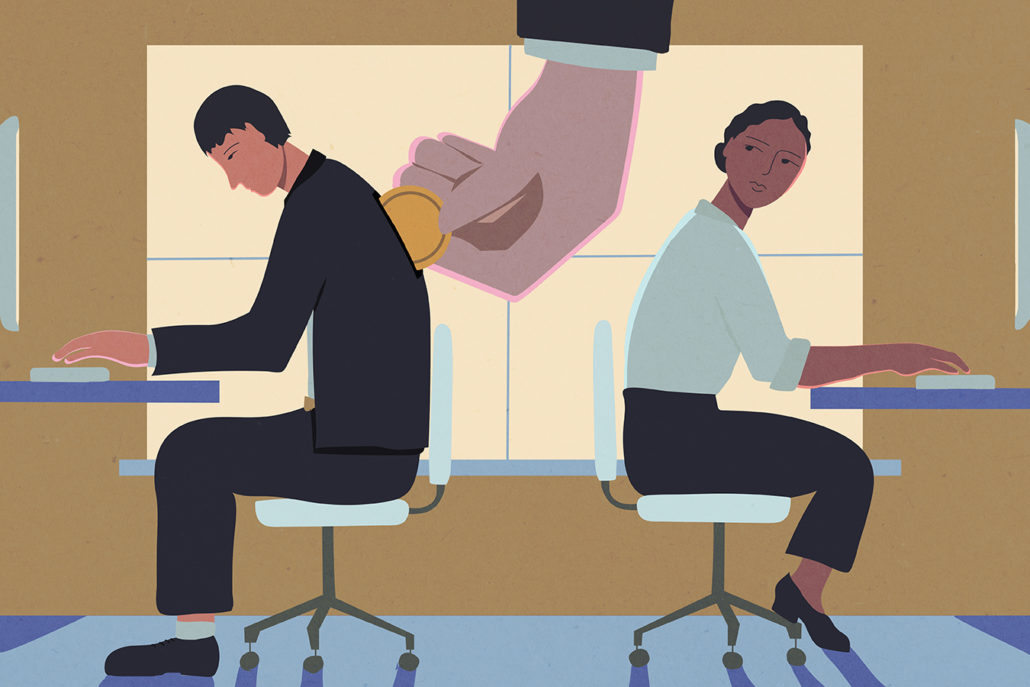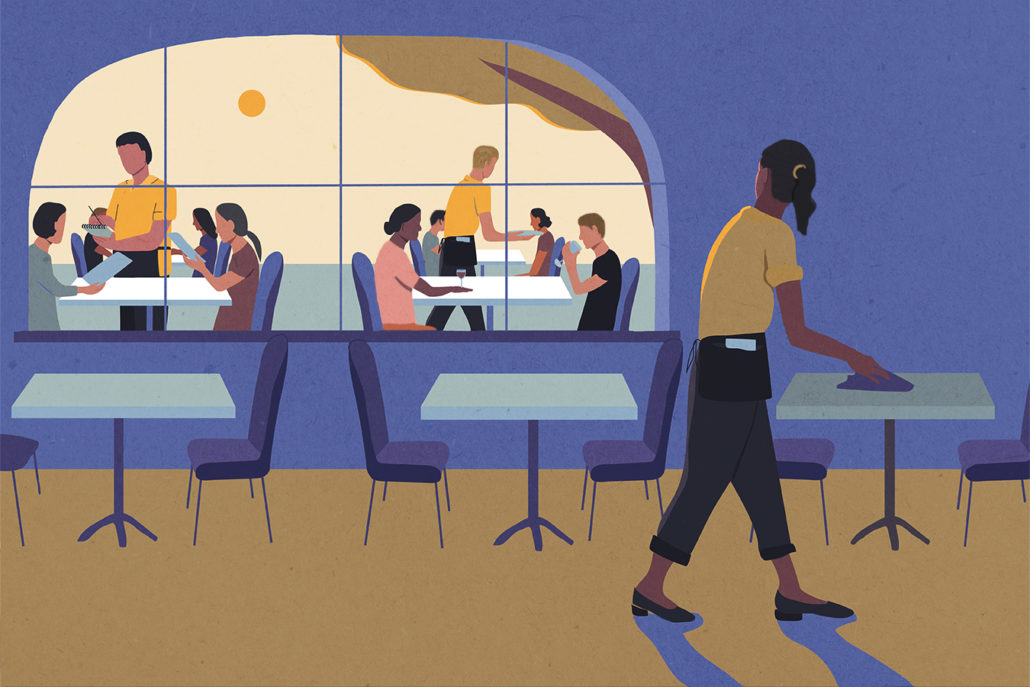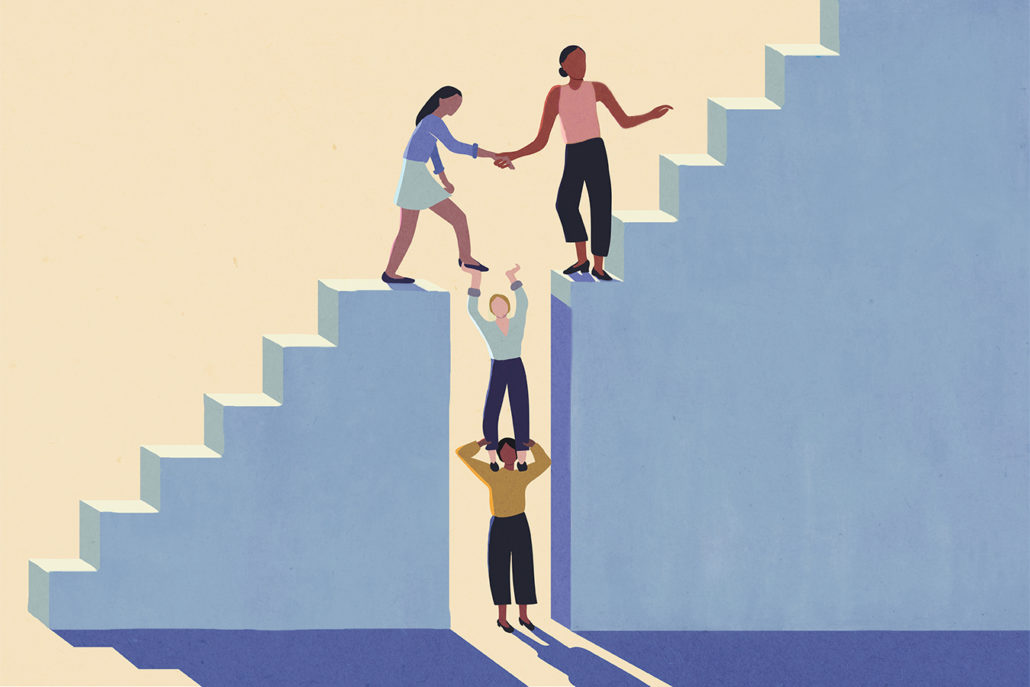
From self-advocacy to changing systems, here’s how Canadians are striving for equal pay for equal work
The best career advice Nana aba Duncan ever received as a woman entering salary negotiations: Set an expectation, then take a beat and just say nothing. Sit still for about as long as it would take to have a long gulp from a tall glass of water—visualize drinking from that glass if you’re struggling with the uncomfortable silence.
That was two years ago, when the CBC Radio personality and producer was offered her current job, as the host of the broadcaster’s high-profile weekend morning show, Fresh Air. “I was very scared, because negotiating is a way of saying ‘I deserve this and I am worth this,’ and, to be frank, I hadn’t had a conversation like that for a while.”
Ultimately, Duncan’s negotiations went well. The process of advocating for the salary she knew she deserved brought up discomfort, nonetheless—not because of the environment in which she found herself, but simply because she had never done it before. “When I first started here, I was just grateful,” she says. “And I took what they gave me…I didn’t realize negotiating was something I could even consider, something I now know many people do.”
For working Canadian women and trans and non-binary individuals, self-advocacy is a crucial skill, because the risk of being paid less than cis male counterparts is real.
Sometimes it’s a question of learning it’s OK (even expected) to negotiate—something Duncan now makes a point of discussing with female friends and interns. But oftentimes—in jobs in every field and at every level—it’s also about tackling inherently discriminatory hiring practices and workplace cultures. “Women for so long were not seen as equal, so why would they be paid as equals?” says Duncan. In 2019, whether we’re employees, employers or allies, we all have a role to play in closing the pay gap.
Pay gap or gulf?
According to Statistics Canada, women are paid an average of 87 cents for every dollar earned by a man. Indigenous women see even more dramatic disparities, earning more than a third less, on average, than non-Indigenous men and 18 percent less than Indigenous men. Racialized women typically earn 34 percent less than Caucasian men (and 19 percent less than racialized men). When more than one of these identities intersect, the pay gap becomes more like a gulf.
Trans women are subject to the same pay inequities as cis women—as well as facing the extra barriers that can arise from transphobia in the hiring process. According to Curran Stikuts, the manager of community engagement at The 519, a United Way–supported agency and queer advocacy centre, the Statistics Canada data overlooks how discrimination based on gender identity and sexual orientation can hit earning power hard. “The way these studies are set up [prevents] us from understanding our communities,” Stikuts says. “We know the issues, but it can be really difficult to find information.”
The lack of data makes advocating for reform more challenging. Nonetheless, by listening to their clientele and identifying the issues queer women and non-binary folks face, The 519 offers training in areas such as asking for fair pay, communicating effectively with HR, and standing up to insidious forms of discrimination—sexism, homophobia and transphobia—that might become barriers to getting hired or promoted in the first place.

Newcomers can have it even harder
Women who are new to Canada can face extra challenges in being fairly compensated for their work. May*, a recent newcomer from Japan, applied for several jobs in Asian restaurants when she first arrived in Toronto and spoke little English. She typically had to do an unpaid trial, unpaid training and then a couple more weeks on minimum wage. She was instructed to hand over her tips to employers. “At one place I was asked to do a two-hour unpaid trial, but when the time was up, the restaurant owner said, ‘It’s busy, can you work more?’ I ended up working two full days without payment.” Most of May’s co-workers in front-of-house roles were women, and she felt that their employers took advantage of them being broke, ignorant of Canadian laws and afraid to speak up.
In her current job in a restaurant in Greektown, May says she’s paid for all the hours she works, but she still takes home significantly less than the male servers. “The majority of workers in this restaurant are men and they do all the decision making about who will cover each section of tables,” she explains. “When it is sunny and customers are on the patio, the other female server and I are told, ‘You’re inside today.’ If it rains, the men give us the empty patio. When I found the courage to say this wasn’t fair, my co-worker said to me, “Why do females complain all the time?”
To empower newcomer and racialized women, who are over-represented in precarious and lower-paid jobs, Access Alliance Multicultural Health and Community Services (a United Way–supported agency) spearheaded the Promoting Decent Work for Racialized Women project. “We work with community action leaders to support them in building knowledge and doing outreach to help racialized women better understand their rights, and learn things like how to negotiate pay and scheduling, and to ask about benefits,” says Executive Director Axelle Janczur.
“A decent wage makes the difference between these women’s kids having snacks for school or not; between paying the rent or feeding the kids; between walking for kilometres to get to work or having enough money to buy a transit token,” says Janczur. “It’s about the dignity. If we don’t get the issues fixed as a society, what are our fundamental values?”

The employer’s part
We may assume the onus should be on employers to abide by anti-discrimination legislation and tackle more insidious sexist workplace practices that hurt women’s incomes, but that’s not always the case. “Employers are a critical piece of this, but the reality is that so many of the people that run the small businesses often don’t have the greatest grasp on labour laws,” Janczur says.
What the government is doing
In recent years, a number of national and provincial advocacy groups have been working hard to address the issues that can lead to women and non-binary or trans folks being paid less. The Canadian Centre for Policy Alternatives, the Ontario Equal Pay Coalition and the Ontario Public Service Employees Union (OPSEU) have all been active in this regard. A big win came in Ontario in 2018, with the country’s first provincial wage transparency legislation, called Equal Pay for Equal Work. This act requires employers to justify wage gaps between two employees whose job descriptions are identical, and shields workers from repercussions for opening up a discussion about pay equity with their employer.
Before policy, self-empowerment
While legislative changes are happening slowly, equal pay for equal work is still far from the reality. Today, the responsibility often remains on individuals to advocate for what they deserve. The issues that lead to wage inequity are often private—and systemic—so even the most accomplished women who enter contract negotiations might be unaware of what their male counterparts are earning. This lack of knowledge means women can undercut themselves within systems that will not correct them.
Many individuals vulnerable to salary inequities are turning to websites like Glassdoor to get a sense of the range of salaries paid for jobs in their company or industry (this information is submitted anonymously by other users). They’re also breaking a social taboo and having frank conversations with trusted peers and mentors to help them gauge what they could and should be paid.
And the next step? If you’re in a position to advocate for yourself, do it.
“Make the ask. Do it for yourself. Do it for anyone who’s like you,” Duncan says. “Some of these moves that we make are not just good for ourselves. It’s a heavy responsibility. Hopefully, someday equal pay will be a given. Until then, some of us have to throw our elbows up.”